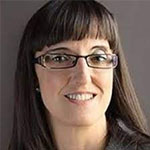Master’s Degree in Early Childhood Intervention
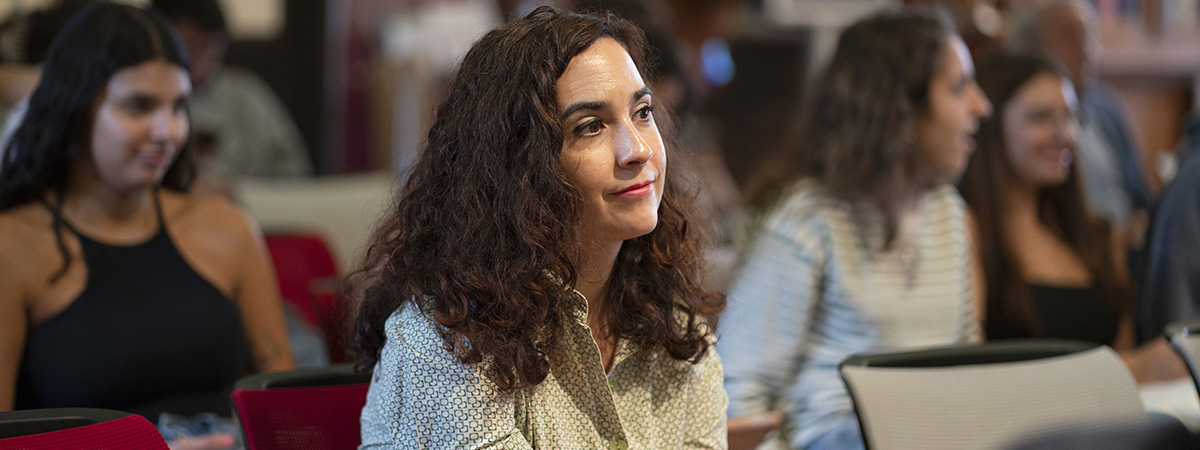
Program endorsed by experience training Nebrija University professors for more than 20 years
The increase in premature births and the need to reduce its harmful effects on babies before the age of six constitute factors that reaffirm the need for specific, advanced and professional care that must be mediated by all the quality guarantees offered by official education.
In this context, the Master's Degree in Early Childhood Intervention appears with the aim of offering specialized training that enables students to design and develop Early Intervention programs in the educational context, from a perspective that includes working with the family and the community and coordinated participation in a multidisciplinary Early Intervention team.
The distance learning modality in which this master's degree will be taught is fully adapted to any student profile. The time flexibility and the possibility of studying from anywhere mean that this program can reach more professionals.
Collaborative learning is guaranteed, and the pace of study is personalized. Pedagogical innovation sets us apart and our commitment to inclusive, equitable and quality education promotes new learning opportunities.
As the culmination of the year in which the V Centenary of the death of Antonio de Nebrija is commemorated, an exhibition was organized at the National Library of Spain that shows the intellectual profile of the first Spanish humanist, without forgetting him as a man, researcher and professor through his enormous work.
Student profile:Graduado universitario o equivalente (licenciados o diplomados), en Magisterio, Pedagogía, Psicología (con mención o especialidad en educación) o Psicopedagogía. Asimismo, dado el carácter transversal del programa, podrán acceder al Máster aquellos estudiantes que hayan finalizado el Máster en Formación del Profesorado de ESO y Bachillerato, FP y Enseñanza de Idiomas o estén en posesión del Certificado de Aptitud Pedagógica (CAP), así como otros Graduados y Licenciados Universitarios que sean profesionales de la Docencia o ejerzan como Profesores en Instituciones Educativas, Escuelas de Negocios o Universidades (incluido los profesores doctores del sector universitario)University graduate or equivalent (bachelor's or associate's degrees) in Teaching, Pedagogy, Psychology (with a specialization or specialty in education) or Psychopedagogy. Likewise, given the transversal nature of the program, students who have completed the Master's Degree in Teacher Training for Compulsory Secondary Education and Baccalaureate, Vocational Training and Language Teaching, or who have a Teaching Aptitude Certificate (CAP), as well as others, will be able to access this master's degree. University graduates who are teaching professionals or work as Professors in Educational Institutions, Business Schools or Universities (including PhD professors in the university sector).
Graduate profile:The profile of the graduate in this Master's Degree in Early Childhood Intervention is that of a professional specifically trained for early assessment and intervention in the educational context, including the family environment in the work process. They will be professionals with the ability to integrate into an interdisciplinary team for early intervention, and competent in designing and organizing early intervention programs in the educational environment.
The graduate of this Master's Degree in Early Childhood Intervention may also provide the technical assessments that are required by other professionals or institutions in the exercise of their competency.
Official Degree:Master’s Degree in Early Childhood Intervention
Learning Center:School of Language and Education
Branch of knowledge: Languages and Education
Places offered: 300
Total Credits 60 credits.
Minimum 12 ECTS credits and maximum 60 ECTS credits per enrollment and academic year
Academic year it was introduced: 2023/2024
Duration: 1 year.
Teaching Type:: Classroom attendance - Online
Academic Regulations: General student’s regulations. Credit transfer and recognition. Regulation of student participation. Common procedures for carrying out the Final Research Project
University Services: [+info]
Internal Quality Assurance System System managers Incidents, Suggestions and Complaints Job placement report and assessment of training received
Collaborate with the CEDI Group in cognitive research projects
Curriculum
The student must take 60 credits
First Semester 30 ECTS
From October to January, both included- 6 ECTS | Early intervention systems and models
- 6 ECTS | Early intervention systems and models
- 6 ECTS | Evaluation and diagnostic tests in early intervention
- 6 ECTS | Disorders and needs in early intervention
- 6 ECTS | Methodology and intervention in early childhood
Second Semester 30 ECTS
Profesores
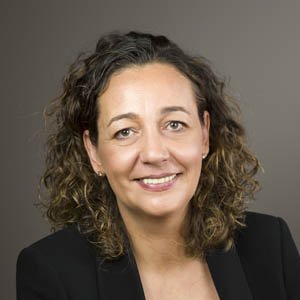 Nuria Camuñas Sánchez-Paulete
Vicedecana de la Facultad de Lenguas y Educación y Directora del Departamento de Educación
Vice Dean of the Faculty of Languages and Education and Director of the Department of Education
Doctora en Psicología por la UCM. Máster en Intervención en la Ansiedad y el Estrés (UCM). Licenciada con grado en Psicología (UCM). Vicedecana y directora del Departamento de Educación, Facultad de Lenguas y Educación. Profesora de grado y postgrado en esa misma facultad. Docente de distintos cursos de formación y máster, sobre ansiedad, emociones y educación, estrés, modificación de conducta y dificultades del aprendizaje. Autora de distintas publicaciones y presentaciones en congresos relacionadas con procesos cognitivos, emoción y educación, prevención y control del estrés, etc. Miembro del grupo de investigación CEDI (Cognición, Educación y Diferencias Individuales). Otras líneas de investigación: Cognición, Emoción, Salud y Educación.
ncamunas@nebrija.es
Nuria Camuñas Sánchez-Paulete
Vicedecana de la Facultad de Lenguas y Educación y Directora del Departamento de Educación
Vice Dean of the Faculty of Languages and Education and Director of the Department of Education
Doctora en Psicología por la UCM. Máster en Intervención en la Ansiedad y el Estrés (UCM). Licenciada con grado en Psicología (UCM). Vicedecana y directora del Departamento de Educación, Facultad de Lenguas y Educación. Profesora de grado y postgrado en esa misma facultad. Docente de distintos cursos de formación y máster, sobre ansiedad, emociones y educación, estrés, modificación de conducta y dificultades del aprendizaje. Autora de distintas publicaciones y presentaciones en congresos relacionadas con procesos cognitivos, emoción y educación, prevención y control del estrés, etc. Miembro del grupo de investigación CEDI (Cognición, Educación y Diferencias Individuales). Otras líneas de investigación: Cognición, Emoción, Salud y Educación.
ncamunas@nebrija.es
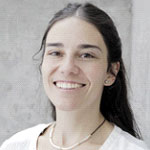 Paula C. Contesse Carvacho
Directora del Máster en Atención Temprana
Director of the Master’s Degree in Early Childhood Intervention
Doctora en Ciencias de la Educación por la Universidad Autónoma de Barcelona. Máster en Investigación en Educación (UAB) y Máster en Psicopedagogía en la Universidad del Desarrollo de Chile. Formación de grado de Profesora de Educación Primaria y Diferencial con especialidad en Discapacidad Intelectual. Autora de publicaciones y presentaciones en congresos relacionados con la discapacidad intelectual en diversos temas: calidad de vida, atención a la diversidad, inclusión especial y universitaria. Se ha desempeñado como profesora tanto en centros de educación especial en niveles de atención temprana como en colegios regulares, en educación primaria y en proyectos de inclusión educativa. Ha desempeñado funciones en educación universitaria como profesora en formación inicial de carreras de Psicopedagogía, Educación Especial, Educación Infantil y Primaria.
pcontess@nebrija.es
Paula C. Contesse Carvacho
Directora del Máster en Atención Temprana
Director of the Master’s Degree in Early Childhood Intervention
Doctora en Ciencias de la Educación por la Universidad Autónoma de Barcelona. Máster en Investigación en Educación (UAB) y Máster en Psicopedagogía en la Universidad del Desarrollo de Chile. Formación de grado de Profesora de Educación Primaria y Diferencial con especialidad en Discapacidad Intelectual. Autora de publicaciones y presentaciones en congresos relacionados con la discapacidad intelectual en diversos temas: calidad de vida, atención a la diversidad, inclusión especial y universitaria. Se ha desempeñado como profesora tanto en centros de educación especial en niveles de atención temprana como en colegios regulares, en educación primaria y en proyectos de inclusión educativa. Ha desempeñado funciones en educación universitaria como profesora en formación inicial de carreras de Psicopedagogía, Educación Especial, Educación Infantil y Primaria.
pcontess@nebrija.es
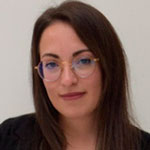 Helena Domínguez Santos
Coordinadora Académica del Máster en Atención Temprana
Academic Coordinator of the Master’s Degree in Early Childhood Intervention
Graduada en Pedagogía por la Universidad de Granada. Coordinadora académica de titulaciones oficiales y tutora de prácticas. Formación complementaria en calidad educativa, e-elarning, dificultades de aprendizaje, gestión de personas. Experiencia como docente de acciones formativas en modalidad online relacionadas con el ámbito de la educación. Técnico de formación. Coordinadora de proyectos académicos en instituciones de formación online. Dinamizadora de formación. Coordinación de claustro docente. Atención al alumnado.
hdomingu@nebrija.es
Helena Domínguez Santos
Coordinadora Académica del Máster en Atención Temprana
Academic Coordinator of the Master’s Degree in Early Childhood Intervention
Graduada en Pedagogía por la Universidad de Granada. Coordinadora académica de titulaciones oficiales y tutora de prácticas. Formación complementaria en calidad educativa, e-elarning, dificultades de aprendizaje, gestión de personas. Experiencia como docente de acciones formativas en modalidad online relacionadas con el ámbito de la educación. Técnico de formación. Coordinadora de proyectos académicos en instituciones de formación online. Dinamizadora de formación. Coordinación de claustro docente. Atención al alumnado.
hdomingu@nebrija.es
 Julia Pardo López
Profesora y Directora TFM
Professor and Director TFM
Diplomada en Magisterio de Educación Primaria y Licenciada en Psicopedagogía, ambas por la Universidad de Granada (UGR). Actualmente cursando el Doctorado en Educación por la UGR. La tesis doctoral se desarrolla sobre la Competencia Lectora, una investigación sobre la realidad educativa con diferentes líneas de investigación y propuestas de renovación metodológica. Máster en Psicodiagnóstico y Tratamiento de la Atención Temprana por la Universidad Camilo José Cela (Madrid). Profesora del Máster de Atención Temprana de la Universidad de Nebrija. Y, al mismo tiempo, profesora del Máster de Calidad e Innovación Docente de la misma universidad. Profesora de Educación Primaria y Secundaria en un colegio internacional bilingüe, y psicopedagoga en el Departamento de Orientación. Profesora del Máster de Profesorado y tutora de Practicum en la Universidad Internacional Isabel I, durante los últimos dos años. Otras líneas de investigación actuales: Educación Inclusiva; Educación Bilingüe; Neuroeducación.
jpardo@nebrija.es
Julia Pardo López
Profesora y Directora TFM
Professor and Director TFM
Diplomada en Magisterio de Educación Primaria y Licenciada en Psicopedagogía, ambas por la Universidad de Granada (UGR). Actualmente cursando el Doctorado en Educación por la UGR. La tesis doctoral se desarrolla sobre la Competencia Lectora, una investigación sobre la realidad educativa con diferentes líneas de investigación y propuestas de renovación metodológica. Máster en Psicodiagnóstico y Tratamiento de la Atención Temprana por la Universidad Camilo José Cela (Madrid). Profesora del Máster de Atención Temprana de la Universidad de Nebrija. Y, al mismo tiempo, profesora del Máster de Calidad e Innovación Docente de la misma universidad. Profesora de Educación Primaria y Secundaria en un colegio internacional bilingüe, y psicopedagoga en el Departamento de Orientación. Profesora del Máster de Profesorado y tutora de Practicum en la Universidad Internacional Isabel I, durante los últimos dos años. Otras líneas de investigación actuales: Educación Inclusiva; Educación Bilingüe; Neuroeducación.
jpardo@nebrija.es
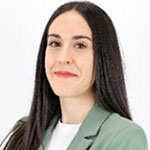 Patricia Ortiz Ruiz
Profesora y Directora TFM
Professor and Director TFM
Graduada en Pedagogía y Máster en Profesorado Educación Secundaria Obligatoria y Formación Profesional. Especialidad Formación y Orientación Laboral. Itinerario Orientación Educativa; ambos por la Universidad de Granada. Formación complementaria en Atención a la diversidad y neuroeducación. Trabajó en el Taller Ocupacional de Atarfe (Granada) donde sus tareas se centraban en la enseñanza de aspectos básicos de lecto-escritura, matemáticas o lenguaje a personas con diversidad funcional. También desarrollaba tareas encaminadas a la adquisición de la autonomía e independencia de las personas usuarias. Participó en el Proyecto Cantera (Diputación de Granada) donde se encargó del desarrollo de sesiones educativas a través de dinámicas para el fomento de la participación social, el conocimiento de las emociones propias y las de los demás, además del desarrollo de estrategias para hacer frente a ellas, en un instituto de la ciudad.
portizru@nebrija.es
Patricia Ortiz Ruiz
Profesora y Directora TFM
Professor and Director TFM
Graduada en Pedagogía y Máster en Profesorado Educación Secundaria Obligatoria y Formación Profesional. Especialidad Formación y Orientación Laboral. Itinerario Orientación Educativa; ambos por la Universidad de Granada. Formación complementaria en Atención a la diversidad y neuroeducación. Trabajó en el Taller Ocupacional de Atarfe (Granada) donde sus tareas se centraban en la enseñanza de aspectos básicos de lecto-escritura, matemáticas o lenguaje a personas con diversidad funcional. También desarrollaba tareas encaminadas a la adquisición de la autonomía e independencia de las personas usuarias. Participó en el Proyecto Cantera (Diputación de Granada) donde se encargó del desarrollo de sesiones educativas a través de dinámicas para el fomento de la participación social, el conocimiento de las emociones propias y las de los demás, además del desarrollo de estrategias para hacer frente a ellas, en un instituto de la ciudad.
portizru@nebrija.es
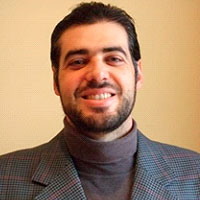 Juan Moisés De la Serna Tuya
Profesor y Director de TFM
Professor and Director TFM
Doctor en Psicología por la U.Sevilla. Máster Máster en Neurociencias y Biología del Comportamiento (UPO). Máster en en Flipped Classroom; Máster en Digital E-Learning y redes sociales ; Máster en Gamificación y Recursos Digitales ; Máster en Neuroeducación y Educación Física (U.CEU) Licenciado con grado en Psicología (U.Sevilla).
Profesor en el Dpto. de Postgrado en asignaturas del ámbito de la psicología, educación y neurociencia.
Autor de distintas publicaciones y presentaciones en congresos relacionadas con procesos cognitivos, emoción, Alzheimer, altas capacidades, etc. Líneas de investigación: Emoción y Cognición y Salud.
jserna@nebrija.es
Juan Moisés De la Serna Tuya
Profesor y Director de TFM
Professor and Director TFM
Doctor en Psicología por la U.Sevilla. Máster Máster en Neurociencias y Biología del Comportamiento (UPO). Máster en en Flipped Classroom; Máster en Digital E-Learning y redes sociales ; Máster en Gamificación y Recursos Digitales ; Máster en Neuroeducación y Educación Física (U.CEU) Licenciado con grado en Psicología (U.Sevilla).
Profesor en el Dpto. de Postgrado en asignaturas del ámbito de la psicología, educación y neurociencia.
Autor de distintas publicaciones y presentaciones en congresos relacionadas con procesos cognitivos, emoción, Alzheimer, altas capacidades, etc. Líneas de investigación: Emoción y Cognición y Salud.
jserna@nebrija.es
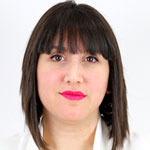 María José Pérez Páez
Profesora y Directora TFM
Professor and Director TFM
Licenciada en Psicología por la Universidad de Granada y Experta en la Prevención de los Efectos de la Pornografía en la Salud Afectivo-Sexual por la Universidad Rey Juan Carlos. Además de psicóloga, sexóloga y experta en pornografía y salud afectivo-sexual, también soy redactora de contenidos didácticos relacionados con la Psicología Clínica, Sexología y Terapia de Pareja, y tengo formación y experiencia en el abordaje de diversos aspectos del Trastorno del Espectro Autista (TEA), discapacidad y diversidad funcional, entre otros. Actualmente trabajo como Team Manager de Health Area del departamento Content Lab de Euroinnova Internacional Online Education, del grupo empresarial Educa EdTech Group, en el que trabajamos contenidos del área de sanidad, psicología y sexología, salud física y mental, nutrición, fisioterapia, enfermería, medicina y farmacia, entre otras facultades docentes.
También he sido docente del “Itinerario Formativo sobre Prevención y Atención a la Violencia Externa en el Ámbito Laboral”, organizado por la Diputación de Granada y docente de la formación “Violencia en el Ámbito Laboral por Razón de Género”, organizado por el Instituto Aragonés de la Mujer. He participado en la I Jornada sobre Pornografía y Violencia Sexual: Efectos en la Salud e Intervenciones Preventivas, organizada por la Universidad Rey Juan Carlos, con mi ponencia “Sexualidad, pornografía y familias. Otro puzzle que armar”.
mperezpa@nebrija.es
María José Pérez Páez
Profesora y Directora TFM
Professor and Director TFM
Licenciada en Psicología por la Universidad de Granada y Experta en la Prevención de los Efectos de la Pornografía en la Salud Afectivo-Sexual por la Universidad Rey Juan Carlos. Además de psicóloga, sexóloga y experta en pornografía y salud afectivo-sexual, también soy redactora de contenidos didácticos relacionados con la Psicología Clínica, Sexología y Terapia de Pareja, y tengo formación y experiencia en el abordaje de diversos aspectos del Trastorno del Espectro Autista (TEA), discapacidad y diversidad funcional, entre otros. Actualmente trabajo como Team Manager de Health Area del departamento Content Lab de Euroinnova Internacional Online Education, del grupo empresarial Educa EdTech Group, en el que trabajamos contenidos del área de sanidad, psicología y sexología, salud física y mental, nutrición, fisioterapia, enfermería, medicina y farmacia, entre otras facultades docentes.
También he sido docente del “Itinerario Formativo sobre Prevención y Atención a la Violencia Externa en el Ámbito Laboral”, organizado por la Diputación de Granada y docente de la formación “Violencia en el Ámbito Laboral por Razón de Género”, organizado por el Instituto Aragonés de la Mujer. He participado en la I Jornada sobre Pornografía y Violencia Sexual: Efectos en la Salud e Intervenciones Preventivas, organizada por la Universidad Rey Juan Carlos, con mi ponencia “Sexualidad, pornografía y familias. Otro puzzle que armar”.
mperezpa@nebrija.es
 María Ángeles Prieto Bolívar
Profesora y Directora TFM
Professor and Director TFM
Psicóloga sanitaria experta en Neuropsicología clínica por el COP. Posgrado de especialización en Neuropsicología clínica (UAL-SANP) Master en Atención Temprana. Master en Intervención Psicológica en ámbitos clínicos y sociales, itinerario en neuropsicología clínica (UAL). Licenciada en psicología (UGR). Profesora y coordinadora de prácticas del posgrado de especialización en Neuropsicología clínica (UAL-SANP). Docente de distintos cursos de formación y máster, sobre neurodesarrollo, atención temprana, evaluación e intervención neuropsicológica y dificultades del aprendizaje. Autora de distintas publicaciones y presentaciones en congresos relacionadas con el autismo en niños y adultos, con el procesamiento lingüístico en personas sordas y con la validación y baremación de nuevas pruebas de evaluación neuropsicológica.
mprietbo@nebrija.es
María Ángeles Prieto Bolívar
Profesora y Directora TFM
Professor and Director TFM
Psicóloga sanitaria experta en Neuropsicología clínica por el COP. Posgrado de especialización en Neuropsicología clínica (UAL-SANP) Master en Atención Temprana. Master en Intervención Psicológica en ámbitos clínicos y sociales, itinerario en neuropsicología clínica (UAL). Licenciada en psicología (UGR). Profesora y coordinadora de prácticas del posgrado de especialización en Neuropsicología clínica (UAL-SANP). Docente de distintos cursos de formación y máster, sobre neurodesarrollo, atención temprana, evaluación e intervención neuropsicológica y dificultades del aprendizaje. Autora de distintas publicaciones y presentaciones en congresos relacionadas con el autismo en niños y adultos, con el procesamiento lingüístico en personas sordas y con la validación y baremación de nuevas pruebas de evaluación neuropsicológica.
mprietbo@nebrija.es
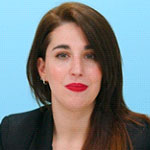 María del Pilar Sola Leyva
Profesora y Directora TFM
Professor and Director TFM
Licenciada en psicología por la Universidad de Granada y Entrenadora en Disciplina Positiva certificada por la Asociación de Disciplina Positiva España (ADPE). Especializada en formación para padres y madres en disciplina positiva, talleres presenciales en Granada. Rectora de contenidos , senior content writer en el área de Health Care del grupo empresarial Educa Edtech.
msolale@nebrija.es
María del Pilar Sola Leyva
Profesora y Directora TFM
Professor and Director TFM
Licenciada en psicología por la Universidad de Granada y Entrenadora en Disciplina Positiva certificada por la Asociación de Disciplina Positiva España (ADPE). Especializada en formación para padres y madres en disciplina positiva, talleres presenciales en Granada. Rectora de contenidos , senior content writer en el área de Health Care del grupo empresarial Educa Edtech.
msolale@nebrija.es
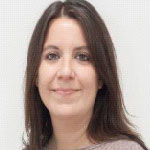 María Sánchez Hortal
Profesora y Directora TFM
Professor and Director TFM
Licenciada en Psicología por la Universidad de Granada. Máster propio en Psicopatología y Psicoterapia en Niños y Adolescentes por la Sociedad Española de Psiquiatría y Psicoterapia en Niños y Adolescentes (SEPYPNA). Máster propio en Intervención psicológica grupal. Psicóloga general sanitaria acreditada y titular en Centro de Atención Infantil Temprana. Intervención psicológica privada con niños y adolescentes. Acreditación de la formación pedagógica y docente para el ingreso en los cuerpos de profesorado de Educación Secundaria y Formación Profesional. Participación en diferentes proyectos docentes: rotaciones alumnado PIR/MIR en Unidad de Docencia y Psicoterapia del Hospital Licinio de la Fuente (Granada), tutora alumnado prácticas en Atención Tempran.
msancheh@nebrija.es
María Sánchez Hortal
Profesora y Directora TFM
Professor and Director TFM
Licenciada en Psicología por la Universidad de Granada. Máster propio en Psicopatología y Psicoterapia en Niños y Adolescentes por la Sociedad Española de Psiquiatría y Psicoterapia en Niños y Adolescentes (SEPYPNA). Máster propio en Intervención psicológica grupal. Psicóloga general sanitaria acreditada y titular en Centro de Atención Infantil Temprana. Intervención psicológica privada con niños y adolescentes. Acreditación de la formación pedagógica y docente para el ingreso en los cuerpos de profesorado de Educación Secundaria y Formación Profesional. Participación en diferentes proyectos docentes: rotaciones alumnado PIR/MIR en Unidad de Docencia y Psicoterapia del Hospital Licinio de la Fuente (Granada), tutora alumnado prácticas en Atención Tempran.
msancheh@nebrija.es
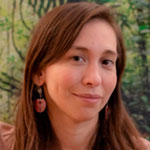 Alondra Camus Torres
Profesora y Directora TFM
Professor and Director TFM
Doctora en Psicología de la Comunicación y el Cambio por la Universitat Autònoma de Barcelona (UAB). Máster en Trastornos de la Comunicación y el Lenguaje (UAB). Fonoaudióloga/Logopeda. Profesora asociada del Departamento de Psicología Básica, Evolutiva y de la Educación de la UAB. Profesora colaboradora en el Grado de Logopedia de la Universidad Oberta de Catalunya. Autora de distintas publicaciones y presentaciones en congresos relacionadas con la evaluación, desarrollo e intervención de las habilidades narrativas en población infantil monolingüe y multilingüe. Miembro del grupo de investigación ELBEC (Educación Lingüística Basada en Evidencia Científica). Otras líneas de investigación: Logopedia, Desarrollo del lenguaje, Trastorno del Desarrollo del Lenguaje.
acamus@nebrija.es
Alondra Camus Torres
Profesora y Directora TFM
Professor and Director TFM
Doctora en Psicología de la Comunicación y el Cambio por la Universitat Autònoma de Barcelona (UAB). Máster en Trastornos de la Comunicación y el Lenguaje (UAB). Fonoaudióloga/Logopeda. Profesora asociada del Departamento de Psicología Básica, Evolutiva y de la Educación de la UAB. Profesora colaboradora en el Grado de Logopedia de la Universidad Oberta de Catalunya. Autora de distintas publicaciones y presentaciones en congresos relacionadas con la evaluación, desarrollo e intervención de las habilidades narrativas en población infantil monolingüe y multilingüe. Miembro del grupo de investigación ELBEC (Educación Lingüística Basada en Evidencia Científica). Otras líneas de investigación: Logopedia, Desarrollo del lenguaje, Trastorno del Desarrollo del Lenguaje.
acamus@nebrija.es
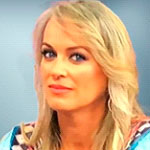 Cristina Lázaro Pérez
Profesora y Directora TFM
Professor and Director TFM
Doctora en Antropología por la Universidad de Murcia (Tesis titulada “La Conciencia en el Umbral del Tránsito: Experiencias cercanas a la Muerte”, codirigida por el Dr. Raymond Moody y Dr. Luis Álvarez Munárriz).
Licenciada en Psicología (UMU), Másteres en Psicooncología, Antropología, Audición y Lenguaje y Protocolo. Experta en Cuidados Paliativos y Especialista en Pérdidas y Duelo. Perteneciente al grupo de investigación “Conciencia, Cultura e Identidad”.
Es autora de libros y publicaciones múltiples artículos científicos recogidos en los cuartiles Q1 y Q2 de JCR y Scopus, especialmente sobre estrés y ansiedad ante la muerte. Ha asistido como ponente en numerosas conferencias de educativas y científicas en diferentes países. Su principal investigación se desarrolló en el ámbito hospitalario estudiando fenómenos como las Experiencias cercanas a la muerte.
clazaro@nebrija.es
Cristina Lázaro Pérez
Profesora y Directora TFM
Professor and Director TFM
Doctora en Antropología por la Universidad de Murcia (Tesis titulada “La Conciencia en el Umbral del Tránsito: Experiencias cercanas a la Muerte”, codirigida por el Dr. Raymond Moody y Dr. Luis Álvarez Munárriz).
Licenciada en Psicología (UMU), Másteres en Psicooncología, Antropología, Audición y Lenguaje y Protocolo. Experta en Cuidados Paliativos y Especialista en Pérdidas y Duelo. Perteneciente al grupo de investigación “Conciencia, Cultura e Identidad”.
Es autora de libros y publicaciones múltiples artículos científicos recogidos en los cuartiles Q1 y Q2 de JCR y Scopus, especialmente sobre estrés y ansiedad ante la muerte. Ha asistido como ponente en numerosas conferencias de educativas y científicas en diferentes países. Su principal investigación se desarrolló en el ámbito hospitalario estudiando fenómenos como las Experiencias cercanas a la muerte.
clazaro@nebrija.es
 Sandra Rute Pérez
Directora TFM
Director TFM
Doctora en Psicología por la Universidad de Granada. Máster en Psicología de la Salud y Máster en Psicología General Sanitaria (UGR). Licenciada con Psicología (UGR).
Docente del Departamento de Psicología Evolutiva y de la Educación, Facultad de Ciencias de la Educación y Facultad de Psicología de la UGR. Profesora de grado y posgrado en esas mismas facultades. Docente y tutora de prácticas en Experto en Neuropsicología Clínica (UAL) y máster, sobre estimulación cognitiva y neuropsicología de los trastornos mentales.
Autora de distintas publicaciones y presentaciones en congresos relacionadas con procesos cognitivos, evaluación y estimulación neuropsicológica, validación de instrumentos de evaluación en población de distintas etapas evolutivas (niños, adolescentes, mayores), dificultades de aprendizaje, etc. Miembro del grupo de investigación CTS-581 (Neuropsicología y Psiconeuroinmunología Aplicadas -PNínsula-). Otras líneas de investigación: Innovación docente y Educación.
srute@nebrija.es
Sandra Rute Pérez
Directora TFM
Director TFM
Doctora en Psicología por la Universidad de Granada. Máster en Psicología de la Salud y Máster en Psicología General Sanitaria (UGR). Licenciada con Psicología (UGR).
Docente del Departamento de Psicología Evolutiva y de la Educación, Facultad de Ciencias de la Educación y Facultad de Psicología de la UGR. Profesora de grado y posgrado en esas mismas facultades. Docente y tutora de prácticas en Experto en Neuropsicología Clínica (UAL) y máster, sobre estimulación cognitiva y neuropsicología de los trastornos mentales.
Autora de distintas publicaciones y presentaciones en congresos relacionadas con procesos cognitivos, evaluación y estimulación neuropsicológica, validación de instrumentos de evaluación en población de distintas etapas evolutivas (niños, adolescentes, mayores), dificultades de aprendizaje, etc. Miembro del grupo de investigación CTS-581 (Neuropsicología y Psiconeuroinmunología Aplicadas -PNínsula-). Otras líneas de investigación: Innovación docente y Educación.
srute@nebrija.es
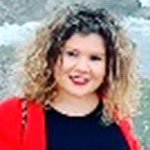 Alejandra Barreiro Collazo
Directora TFM
Director TFM
Doctora en Psicología por la Universidad de Oviedo. Doctora contratada. Profesora de la Universidad Internacional de La Rioja y de la Facultad Padre Ossó, adscrita a la Universidad de Oviedo. También continúa ejerciendo como Psicóloga General Sanitaria en el ámbito de la psicología infantojuvenil y de adultos. Su investigación se centra en la ciberagresión y victimización y en la inclusión educativa. Orcid: https://orcid.org/0000-0001-9640-4680 Google Scholar Profile: https://scholar.google.es/citations?hl=es&user=uJ0SX38AAAAJ
abarreic@nebrija.es
Alejandra Barreiro Collazo
Directora TFM
Director TFM
Doctora en Psicología por la Universidad de Oviedo. Doctora contratada. Profesora de la Universidad Internacional de La Rioja y de la Facultad Padre Ossó, adscrita a la Universidad de Oviedo. También continúa ejerciendo como Psicóloga General Sanitaria en el ámbito de la psicología infantojuvenil y de adultos. Su investigación se centra en la ciberagresión y victimización y en la inclusión educativa. Orcid: https://orcid.org/0000-0001-9640-4680 Google Scholar Profile: https://scholar.google.es/citations?hl=es&user=uJ0SX38AAAAJ
abarreic@nebrija.es
 Ana Nieto Ruiz
Directora TFM
Director TFM
Doctora en Psicología mención Cum Laude (Programa de Doctorado en Medicina Clínica Y Salud Pública. Facultad de Medicina. Universidad de Granada, 2020). Máster oficial en Neurociencias y Dolor (Universidad de Granada, 2011). Máster oficial en Tratamientos Psicológicos y de la Salud (Universidad de Málaga, 2010). Licenciada en Psicología (Universidad de Jaén, 2006). Colegiada por el Colegio Oficial de Psicólogos de Andalucía Occidental (AN07542). Habilitación Psicóloga Clínica. Investigadora en el Departamento de Pediatría, Universidad de Granada (grupo de investigación (grupo PAIDI CTS-187 Nutrición y Metabolismo Infantil) (2014-Actualmente), trabajando principalmente en la evaluación del desarrollo neurocognitivo en lactantes y niños y la programación fetal del neurodesarrollo y comportamiento en hijos de madres obesas y diabéticas. Codirectora y Directora de trabajos de grado en carrera de Nutrición y Dietética (Pontificia Universidad Javeriana, Bogotá, Colombia, 2015-2016) y trabajos fin de máster en el máster oficial NUTRENVIGEN G+D: Condicionantes genéticos nutricionales y ambientales del crecimiento y el desarrollo (Universidad de Granada, 2015-Actualmente). Profesora en el Examen Clínico Objetivo Estructurado (ECOE) del Grado de Medicina (Universidad de Granada) (2016-Actualmente). Colaboradora en Universidad Internacional de Valencia (VIU), desarrollando labores como directora de TFM. Revisora en las siguientes revistas científicas: "Nutrients", "International Journal of Food Science", "Journal of Personalized Medicine" y "Frontiers in Nutrition". Acreditación ANECA a las siguientes figuras: Profesor Contratado Doctor, Profesor Universidad Privada y Profesor Ayudante Doctor. Producción científica: más de 50 comunicaciones científicas en Congresos Nacionales e Internacionales, 4 capítulos de libro, 18 artículos publicados en revistas indexadas en JCR de primer cuartil. Código Orcid: 0000-0002-4303-6228 SCOPUS AUTHOR ID: 56281995700 ResearcherID: GBK-6481-2022 Base de datos Google Scholar: Índice H: 10; i10: 10, Citas: 245; desde 2019: 203.
anietoru@nebrija.es
Ana Nieto Ruiz
Directora TFM
Director TFM
Doctora en Psicología mención Cum Laude (Programa de Doctorado en Medicina Clínica Y Salud Pública. Facultad de Medicina. Universidad de Granada, 2020). Máster oficial en Neurociencias y Dolor (Universidad de Granada, 2011). Máster oficial en Tratamientos Psicológicos y de la Salud (Universidad de Málaga, 2010). Licenciada en Psicología (Universidad de Jaén, 2006). Colegiada por el Colegio Oficial de Psicólogos de Andalucía Occidental (AN07542). Habilitación Psicóloga Clínica. Investigadora en el Departamento de Pediatría, Universidad de Granada (grupo de investigación (grupo PAIDI CTS-187 Nutrición y Metabolismo Infantil) (2014-Actualmente), trabajando principalmente en la evaluación del desarrollo neurocognitivo en lactantes y niños y la programación fetal del neurodesarrollo y comportamiento en hijos de madres obesas y diabéticas. Codirectora y Directora de trabajos de grado en carrera de Nutrición y Dietética (Pontificia Universidad Javeriana, Bogotá, Colombia, 2015-2016) y trabajos fin de máster en el máster oficial NUTRENVIGEN G+D: Condicionantes genéticos nutricionales y ambientales del crecimiento y el desarrollo (Universidad de Granada, 2015-Actualmente). Profesora en el Examen Clínico Objetivo Estructurado (ECOE) del Grado de Medicina (Universidad de Granada) (2016-Actualmente). Colaboradora en Universidad Internacional de Valencia (VIU), desarrollando labores como directora de TFM. Revisora en las siguientes revistas científicas: "Nutrients", "International Journal of Food Science", "Journal of Personalized Medicine" y "Frontiers in Nutrition". Acreditación ANECA a las siguientes figuras: Profesor Contratado Doctor, Profesor Universidad Privada y Profesor Ayudante Doctor. Producción científica: más de 50 comunicaciones científicas en Congresos Nacionales e Internacionales, 4 capítulos de libro, 18 artículos publicados en revistas indexadas en JCR de primer cuartil. Código Orcid: 0000-0002-4303-6228 SCOPUS AUTHOR ID: 56281995700 ResearcherID: GBK-6481-2022 Base de datos Google Scholar: Índice H: 10; i10: 10, Citas: 245; desde 2019: 203.
anietoru@nebrija.es
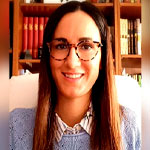 Eva Montero López
Directora TFM
Director TFM
Doctora en Psicología por la UGR. Máster en Psicología General Sanitaria (UGR), Máster en Psicología de la Salud (UGR) y Máster en Psicología de la Actividad Física y del Deporte (UNED).
Personal docente e investigador en la Universidad de Granada. Impartición en grados de Magisterio de Educación Infantil. Educación Primaria y Pedagogía, teoría y práctica. Dirección de TFM.
emontero@nebrija.es
Eva Montero López
Directora TFM
Director TFM
Doctora en Psicología por la UGR. Máster en Psicología General Sanitaria (UGR), Máster en Psicología de la Salud (UGR) y Máster en Psicología de la Actividad Física y del Deporte (UNED).
Personal docente e investigador en la Universidad de Granada. Impartición en grados de Magisterio de Educación Infantil. Educación Primaria y Pedagogía, teoría y práctica. Dirección de TFM.
emontero@nebrija.es
 Sofía Barbero Aguado
Directora TFM
Director TFM
Doctora en Educación por la Universidad Autónoma de Madrid. Pedagogía por la Universidad Complutense de Madrid. Máster en Atención a la Diversidad y Apoyos Educativos por la Universidad de Alcalá de Henares. Miembro del grupo de investigación UNINC el cual orienta sus acciones a la investigación, formación y transferencia en el ámbito de la innovación, inclusión social y educativa y la docencia en la Universidad Autónoma de Madrid.
Cuenta con 10 años de experiencia laboral en el sector de la discapacidad. Actualmente es Orientadora sociolaboral en una fundación que fomenta la autonomía y empleabilidad de personas con discapacidad. Imparte talleres a personas con discapacidad y sus familiares a la vez que lleva cabo el proceso de formación inicial de las personas que se van incorporando al equipo.
sbarbero@nebrija.es
Sofía Barbero Aguado
Directora TFM
Director TFM
Doctora en Educación por la Universidad Autónoma de Madrid. Pedagogía por la Universidad Complutense de Madrid. Máster en Atención a la Diversidad y Apoyos Educativos por la Universidad de Alcalá de Henares. Miembro del grupo de investigación UNINC el cual orienta sus acciones a la investigación, formación y transferencia en el ámbito de la innovación, inclusión social y educativa y la docencia en la Universidad Autónoma de Madrid.
Cuenta con 10 años de experiencia laboral en el sector de la discapacidad. Actualmente es Orientadora sociolaboral en una fundación que fomenta la autonomía y empleabilidad de personas con discapacidad. Imparte talleres a personas con discapacidad y sus familiares a la vez que lleva cabo el proceso de formación inicial de las personas que se van incorporando al equipo.
sbarbero@nebrija.es
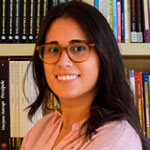 Tania Vieites Lestón
Directora TFM
Director TFM
Doctora en Psicología educativa por la Universidad de A Coruña (UDC). Graduada en Pedagogía por la Universidad de Santiago de Compostela (USC) y Máster en Formación del profesorado, especialidad en Orientación Educativa, por la misma universidad. Graduada en Educación Primaria por la Universidad Pontificia de Salamanca y Máster en Psicopedagogía por la Universidad Complutense de Madrid (UCM). Docente de distintos cursos de grado (Psicología, Educación social, Logopedia, Educación Primaria, Educación Infantil, etc.) y máster (formación del profesorado, envejecimiento y bienestar psicológico, psicología educativa).
Autora de distintas publicaciones y presentaciones en congresos relacionadas con los deberes escolares, autorregulación del aprendizaje, compromiso escolar, abandono escolar, rendimiento académico, familia-escuela, atención a la diversidad, entre otros.
t.vieites@nebrija.es
Tania Vieites Lestón
Directora TFM
Director TFM
Doctora en Psicología educativa por la Universidad de A Coruña (UDC). Graduada en Pedagogía por la Universidad de Santiago de Compostela (USC) y Máster en Formación del profesorado, especialidad en Orientación Educativa, por la misma universidad. Graduada en Educación Primaria por la Universidad Pontificia de Salamanca y Máster en Psicopedagogía por la Universidad Complutense de Madrid (UCM). Docente de distintos cursos de grado (Psicología, Educación social, Logopedia, Educación Primaria, Educación Infantil, etc.) y máster (formación del profesorado, envejecimiento y bienestar psicológico, psicología educativa).
Autora de distintas publicaciones y presentaciones en congresos relacionadas con los deberes escolares, autorregulación del aprendizaje, compromiso escolar, abandono escolar, rendimiento académico, familia-escuela, atención a la diversidad, entre otros.
t.vieites@nebrija.es
 Ana Belén Jorquera Hernández
Directora TFM
Director TFM
Doctora en Educación por la Universidad de Murcia con la investigación "Violencia Escolar, Inteligencia Emocional y Uso de Nuevas Tecnologías en adolescentes de Educación Secundaria Obligatoria". Premio Extraordinario de Doctorado en el año 2021. Máster en Psicología de la Educación en la Universidad de Murcia. Graduada en Educación Primaria por la Universidad de Murcia. Asimismo, ha colaborado con grupos de investigación oficialmente reconocidos de la Universidad de Murcia. Autora de distintas publicaciones y presentaciones en congresos relacionadas con aprendizaje, inteligencia emocional, procesos cognitivos. Otras líneas de investigación: violencia escolar, coaching educativo y actividad física.
ajorquer@nebrija.es
Ana Belén Jorquera Hernández
Directora TFM
Director TFM
Doctora en Educación por la Universidad de Murcia con la investigación "Violencia Escolar, Inteligencia Emocional y Uso de Nuevas Tecnologías en adolescentes de Educación Secundaria Obligatoria". Premio Extraordinario de Doctorado en el año 2021. Máster en Psicología de la Educación en la Universidad de Murcia. Graduada en Educación Primaria por la Universidad de Murcia. Asimismo, ha colaborado con grupos de investigación oficialmente reconocidos de la Universidad de Murcia. Autora de distintas publicaciones y presentaciones en congresos relacionadas con aprendizaje, inteligencia emocional, procesos cognitivos. Otras líneas de investigación: violencia escolar, coaching educativo y actividad física.
ajorquer@nebrija.es
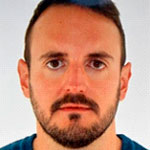 Borja Romero González
Director TFM
Director TFM
Doctor En Psicología por la Universidad de Granada. Graduado en Psicología (UGR) y Máster en Psicología General Sanitaria (UGR). Cuenta con una experiencia docente en departamentos como Personalidad, Evaluación y Tratamiento psicológico, así como Psicología Educativa y de la Educación. Su campo de investigación principal es la influencia del estrés perinatal en la salud materna e infantil. En el presente ámbito cuenta con múltiples publicaciones en revistas de calidad, aportaciones a congresos y capítulos de libro. Además, también investiga sobre la calidad de vida de menores afectados por enfermedades raras y sus familiares.
bromergo@nebrija.es
Borja Romero González
Director TFM
Director TFM
Doctor En Psicología por la Universidad de Granada. Graduado en Psicología (UGR) y Máster en Psicología General Sanitaria (UGR). Cuenta con una experiencia docente en departamentos como Personalidad, Evaluación y Tratamiento psicológico, así como Psicología Educativa y de la Educación. Su campo de investigación principal es la influencia del estrés perinatal en la salud materna e infantil. En el presente ámbito cuenta con múltiples publicaciones en revistas de calidad, aportaciones a congresos y capítulos de libro. Además, también investiga sobre la calidad de vida de menores afectados por enfermedades raras y sus familiares.
bromergo@nebrija.es
 Carmen Hevia Tuero
Directora de TFM
Director TFM
Logopeda y doctora en Psicología por la Universidad de Oviedo. Máster en Investigación en Neurociencias. Posgrado en Trastornos de la Conducta Alimentaria en Pediatría (UManresa). Premio Fin de Grado.
Carmen Hevia Tuero
Directora de TFM
Director TFM
Logopeda y doctora en Psicología por la Universidad de Oviedo. Máster en Investigación en Neurociencias. Posgrado en Trastornos de la Conducta Alimentaria en Pediatría (UManresa). Premio Fin de Grado.
Profesora del grado de Logopedia de la Universidad Internacional de la Rioja (UNIR). Docencia en asignaturas relacionadas con la psicolingüística y con trastornos del lenguaje y la lectoescritura. Autora de distintas publicaciones (incluyendo un capítulo de libro) relacionadas con el aprendizaje de la lectoescritura y el bilingüismo. Presentaciones en congresos internacionales. Miembro del grupo de investigación INCO (Investigación en Neurociencia Cognitiva) de la Universidad de Oviedo. Logopeda en el centro Con mis palabras, especializado en logopedia en población pediátrica: trastornos del lenguaje y otros trastornos del neurodesarrollo, dificultades en el aprendizaje de la lectoescritura, alteraciones del sistema estomatognático y dificultades con la alimentación y otras funciones orales no verbales. chevia@nebrija.es
 Nicole González Benítez
Profesora y Directora de TFM
Professor and Director TFM
Doctora en Educación por la Universidad de La Laguna (ULL). Máster en Intervención Psicopedagógica en Contextos de Educación Formal y No Formal (ULL). Graduada en Maestro en Educación Primaria con Mención en Innovación e Investigación Curricular (ULL). Certificado de Formación Específica en Competencias Digitales para la Docencia (FCD-ULL)
Nicole González Benítez
Profesora y Directora de TFM
Professor and Director TFM
Doctora en Educación por la Universidad de La Laguna (ULL). Máster en Intervención Psicopedagógica en Contextos de Educación Formal y No Formal (ULL). Graduada en Maestro en Educación Primaria con Mención en Innovación e Investigación Curricular (ULL). Certificado de Formación Específica en Competencias Digitales para la Docencia (FCD-ULL)
Actualmente, imparte docencia en grados y postgrados universitarios. Sus áreas de especialización incluyen el aprendizaje y desarrollo en la infancia, aprendizaje social y emocional, dificultades de aprendizaje, metodologías innovadoras en el aula, orientación y acción tutorial, así como la supervisión de prácticas en distintos programas de grado.
Forma parte del Grupo Universitario de Formación y Orientación Integrada (GUFOI), del Grupo Multidisciplinar de Investigación Educativa (MUINED), de la Asociación Interuniversitaria de Investigación Pedagógica (AIDIPE) y de la Red Interuniversitaria de Profesorado de Orientación (RIPO).
ngonzalb@nebrija.es
 Ana Igual Blasco
Profesora y Directora de TFM
Professor and Director TFM
Actualmente cursando el doctorado en Psicología por la UMU. Máster en Neurorehabilitación (UAB-Institut Guttmann). Graduada en Fisioterapia (UMH).
Ana Igual Blasco
Profesora y Directora de TFM
Professor and Director TFM
Actualmente cursando el doctorado en Psicología por la UMU. Máster en Neurorehabilitación (UAB-Institut Guttmann). Graduada en Fisioterapia (UMH).
Fisioterapeuta en el CDIAT-1 de la Fundación Salud Infantil de Elche.
Docente de distintos cursos de formación y máster, sobre atención temprana y fisioterapia en pediatría.
Autora de distintas publicaciones y presentaciones en congresos relacionadas con atención temprana, prematuridad, fisioterapia y terapia acuática. Miembro del Grupo de Investigación del Centro de Investigación en Neurodesarrollo (451.087/451.090 P.I) de la Fundación Salud Infantil. Otras líneas de investigación: fisioterapia respiratoria, prematuridad, atención temprana, estrés materno, apego, etc.
aigual@nebrija.es
 María Hurtado Miron
Profesora y Directora de TFM
Professor and Director TFM
Doctora en Filosofia por la UCM. Posgrado Especialista en clínica y psicoterapia “El niño y la familia” de la Universidad Comillas.. Licenciada con grado en Psicología (UAM). Master en psicoanálisis y Filosfia de la Cultura. Experto en niños y adolescentes por el COP. Profesora de Metodología e Intervención en Atención Temprana.
María Hurtado Miron
Profesora y Directora de TFM
Professor and Director TFM
Doctora en Filosofia por la UCM. Posgrado Especialista en clínica y psicoterapia “El niño y la familia” de la Universidad Comillas.. Licenciada con grado en Psicología (UAM). Master en psicoanálisis y Filosfia de la Cultura. Experto en niños y adolescentes por el COP. Profesora de Metodología e Intervención en Atención Temprana.
Psicologa general Sanitaria. Psicóloga en Hospital Psiquiátrico infantil n1 del área norte de Madrid. Psicóloga Etapa Escolar Fundación Síndrome de Down. Psicóloga en Centro Tres Olivos Psicóloga en Centro de Atención temprana Madrid. Profesora en Escuela de Familias y Talleres de hermanos FSD.
murtdm@nebrija.es
 Laura Lacalle Piñero
Profesora y Directora de TFM
Professor and Director TFM
Graduada en Psicología por la Universidad de Huelva. Máster en Psicología General Sanitaria (US), Máster en intervención psicológica en contextos de riesgo (UCA) y Máster en Atención Temprana (UCA). Formación complementaria sobre Trastornos del Espectro Autista.
Laura Lacalle Piñero
Profesora y Directora de TFM
Professor and Director TFM
Graduada en Psicología por la Universidad de Huelva. Máster en Psicología General Sanitaria (US), Máster en intervención psicológica en contextos de riesgo (UCA) y Máster en Atención Temprana (UCA). Formación complementaria sobre Trastornos del Espectro Autista.
Profesora de grados y postgrado del Departamento de Psicología (UCA) en el Área de Psicología Evolutiva y de la Educación. Con experiencia como Psicóloga Sanitaria en Centros de Atención Infantil Temprana concertados por la Junta de Andalucía.
Autora de publicaciones y presentaciones en congresos relacionadas con su tesis, sobre la evolución del desarrollo cognitivo de niños nacidos prematuros y las variables familiares y contextuales relacionadas. Miembro del grupo de investigación APRIL “Bienestar Psicológico, Riesgo y Protección” (SEJ-594), desarrolla funciones de investigación en varios proyectos sobre Infancia y Familia.
llacallp@nebrija.es
 Laura Lacalle Piñero
Profesora y Directora de TFM
Professor and Director TFM
Graduada en Psicología por la Universidad de Huelva. Máster en Psicología General Sanitaria (US), Máster en intervención psicológica en contextos de riesgo (UCA) y Máster en Atención Temprana (UCA). Formación complementaria sobre Trastornos del Espectro Autista.
Laura Lacalle Piñero
Profesora y Directora de TFM
Professor and Director TFM
Graduada en Psicología por la Universidad de Huelva. Máster en Psicología General Sanitaria (US), Máster en intervención psicológica en contextos de riesgo (UCA) y Máster en Atención Temprana (UCA). Formación complementaria sobre Trastornos del Espectro Autista.
Profesora de grados y postgrado del Departamento de Psicología (UCA) en el Área de Psicología Evolutiva y de la Educación. Con experiencia como Psicóloga Sanitaria en Centros de Atención Infantil Temprana concertados por la Junta de Andalucía.
Autora de publicaciones y presentaciones en congresos relacionadas con su tesis, sobre la evolución del desarrollo cognitivo de niños nacidos prematuros y las variables familiares y contextuales relacionadas. Miembro del grupo de investigación APRIL “Bienestar Psicológico, Riesgo y Protección” (SEJ-594), desarrolla funciones de investigación en varios proyectos sobre Infancia y Familia.
llacallp@nebrija.es
 Elke E. E. Kleinert Altamirano
Directora de TFM
Director TFM
Doctora en Educación por la UAB. Máster en Investigación en Educación (UAB), Licenciada en Educación Preescolar (Normal Berta von Glümer).
Elke E. E. Kleinert Altamirano
Directora de TFM
Director TFM
Doctora en Educación por la UAB. Máster en Investigación en Educación (UAB), Licenciada en Educación Preescolar (Normal Berta von Glümer).
Profesora de lenguas (alemán) en el Colegio Alemán Barcelona. Profesora asociada de grado en la facultad de Educación de la UAB.
Autora de publicaciones y presentaciones en congresos relacionados a la evaluación, transferencia de aprendizajes, trabajo por proyectos y adquisición de segundas lenguas.
Miembro académico del grupo de investigación CIRCE (Center for Imagination in Research, Culture and Education) por la facultad de educación de la Simon Fraser University.
Líneas de investigación: pensamiento matemático infantil, bilingüismo en edad infantil, adquisición de la lectoescritura, formación de conceptos cognitivos, trabajo por proyectos, investigación cualitativa, investigación-acción, educación imaginativa (Kieran Egan, 1997).
ekleiner@nebrija.es
 Fátima María Díaz Freire
Directora de TFM
Director TFM
Doctora en Desarrollo Psicológico, Aprendizaje y Salud por la UDC. Máster Psicología Aplicada (Especialidad en Intervención psicológica en contextos educativos) (UDC). Graduada en Pedagogía (USC).
Fátima María Díaz Freire
Directora de TFM
Director TFM
Doctora en Desarrollo Psicológico, Aprendizaje y Salud por la UDC. Máster Psicología Aplicada (Especialidad en Intervención psicológica en contextos educativos) (UDC). Graduada en Pedagogía (USC).
Ha desempeñado funciones docentes en diversos grados en la Facultad de ciencias de la educación, en la Universidad de A Coruña, donde también ha colaborado en proyectos de investigación sobre deberes escolares de calidad y la implicación familiar. Ha realizado estancias internacionales en la Universidad de Gante (Bélgica) y participa activamente en la gestión de proyectos Erasmus+ y formación online a través de Moodle.
Autora de múltiples publicaciones en revistas de alto impacto, enfocadas en autorregulación, tecnología educativa, implicación familiar, y bienestar estudiantil. Ha presentado su trabajo en numerosos congresos internacionales, destacando temas como el estrés académico, ciberacoso, y estrategias innovadoras en educación. Es miembro del grupo de investigación GIPED y ha contribuido a la formación de docentes mediante seminarios y talleres en metodologías activas y gestión del tiempo.
fdiazf@nebrija.es
 Gema Martínez Hernández
Directora de TFM
Director TFM
Doctoranda en el Programa de Doctorado en Educación de la Escuela Internacional de la Universidad de Almería. Máster Oficial en Atención Temprana: Prevención, Detección e Intervención en las Alteraciones del Desarrollo y del Aprendizaje (UCM). Máster Universitario en Formación del Profesorado de ESO y Bachillerato, FP y Enseñanzas de Idiomas (UCM). Graduada en Pedagogía (UM).
Gema Martínez Hernández
Directora de TFM
Director TFM
Doctoranda en el Programa de Doctorado en Educación de la Escuela Internacional de la Universidad de Almería. Máster Oficial en Atención Temprana: Prevención, Detección e Intervención en las Alteraciones del Desarrollo y del Aprendizaje (UCM). Máster Universitario en Formación del Profesorado de ESO y Bachillerato, FP y Enseñanzas de Idiomas (UCM). Graduada en Pedagogía (UM).
Orientadora educativa en la etapa de Educación Infantil para centros escolares de la Comunidad de Madrid. Con más de seis años de experiencia como terapeuta y coordinadora de centros de Atención Temprana en la Comunidad de Madrid. Ponente en distintos seminarios del Máster Oficial de Atención Temprana de la Universidad Complutense de Madrid.
Autora de distintas publicaciones y presentaciones relacionadas con la didáctica y la innovación educativa para una sociedad inclusiva. Líneas de investigación: Trastornos del Neurodesarrollo; Estimulación Musical; Musicoterapia; Integración Sensorial; Teoría de la Mente; Aprendizaje Cooperativo; Necesidades Educativas Especiales.
gmartihe@nebrija.es
 Marina Araya Vera
Profesora y Directora de TFM
Professor and TFM Director
Doctoranda en Psicología social y de las Organizaciones por la Universidad de Barcelona. Becaria de programa de doctorado en el extranjero en Agencia Nacional de Investigación y Desarrollo de Chile N° 72220249. Máster en Intervención Psicosocial itinerario de investigación, Universidad de Barcelona. Postítulo de metodologías cualitativas críticas, Universidad de Concepción (Chile), Postítulo de psicoterapia sistémica vincular centrada en el niño, adolescente y su familia, Instituto Humaniza, Santiago de Chile. Licenciada con grado en Psicología, Universidad de Valparaíso, Chile.
Marina Araya Vera
Profesora y Directora de TFM
Professor and TFM Director
Doctoranda en Psicología social y de las Organizaciones por la Universidad de Barcelona. Becaria de programa de doctorado en el extranjero en Agencia Nacional de Investigación y Desarrollo de Chile N° 72220249. Máster en Intervención Psicosocial itinerario de investigación, Universidad de Barcelona. Postítulo de metodologías cualitativas críticas, Universidad de Concepción (Chile), Postítulo de psicoterapia sistémica vincular centrada en el niño, adolescente y su familia, Instituto Humaniza, Santiago de Chile. Licenciada con grado en Psicología, Universidad de Valparaíso, Chile.
Docente de este máster en Atención Temprana de la Universidad de Nebrija. Ha impartido clases sobre psicología evolutiva de infancia y adolescencia, intervención psicosocial y psicológica en contextos comunitarios, psicología social- comunitaria.
Autora de distintas publicaciones y presentaciones en congresos relacionadas con a las infancias y juventudes desde la psicología clínica y social-comunitaria, política social de infancia, los derechos del niño/a, servicios sociales de atención temprana, con especial atención a la perspectiva de los niños/as y los jóvenes.
Otras líneas de investigación: Desarrollo infantil, infancia y adolescencia, política social de infancia, atención temprana.
marina.araya.v@gmail.com
 Roger Llopart Alari
Director de TFM
TFM Director
Doctor en Ciencias de la Educación por la Universidad de Barcelona, con un Máster en Intervenciones Sociales y Educativas y una Licenciatura en Pedagogía por la misma universidad. También cuenta con un Diplomado en Educación Social por la Universidad Ramon Llull.
Roger Llopart Alari
Director de TFM
TFM Director
Doctor en Ciencias de la Educación por la Universidad de Barcelona, con un Máster en Intervenciones Sociales y Educativas y una Licenciatura en Pedagogía por la misma universidad. También cuenta con un Diplomado en Educación Social por la Universidad Ramon Llull.
Con más de 15 años de experiencia en el ámbito social y educativo, ha desarrollado su labor en la DGAIA, centrándose en la protección de la infancia y adolescencia. Actualmente, es profesor asociado en el Departamento de Pedagogía Aplicada de la Universidad de Barcelona (UAB) y profesor colaborador en el Grado de Educación Social de la Universidad Oberta de Catalunya (UOC).
 Karina Villarroel Ambiado
Directora de TFM
TFM Director
Doctora en educación. Universidad academia humanismo cristiano, Santiago.
Karina Villarroel Ambiado
Directora de TFM
TFM Director
Doctora en educación. Universidad academia humanismo cristiano, Santiago.
Educadora de párvulos. Licenciada en educación. Universidad san Sebastián, concepción.
Profesora especialista en educación diferencial con mención en trastornos específicos del aprendizaje. Universidad de concepción. Máster en lenguajes y contextos en educación infantil. Universitat Ramon Llull, España. Magíster en gestión e inclusión laboral de personas en situación de discapacidad. Universidad Andrés bello, Santiago. Diplomada en investigación con las infancias. Fundación remolino, la serena, chile. Diplomada en pedagogía de las diferencias, Flacso, Argentina. Diplomada en infancia y pedagogía, Flacso Argentina. Formación en Pedagogía Reggiana, a través de seminarios, cursos y grupos de estudios en las escuelas de Reggio Emilia, Red solare, Reggio Children y asociación Rosa Sensat.
Educadora de Párvulos en contextos educativos no formales: hospital, centro de cumplimiento penitenciario y Programa Mejoramiento a la infancia – PIIE. Docente de pre y posgrado en el ámbito de la educación inicial. En el ámbito de la gestión, destacan la coordinación pedagógica, secretaría académica, directora de la carrera Educación Parvularia y Directora de programa de Magister en Educación Inicial. Facilitadora en instancias de fortalecimiento docente a educadores de párvulos, con equipos de Fundación Integra, JUNJI, Redes comunales del sistema de protección a la Infancia Chile Crece Contigo y de diversas instituciones educativas (colegios, corporaciones, fundaciones).
Actualmente, Directora Regional de Fundación Integra, Biobío.
Autora de publicaciones y presentaciones en congresos relacionadas con educación inicial, escucha, documentación pedagógica, entre otros.
karivillar@gmail.com
 Daniela Mieres Maldonado
Directora de TFM
TFM Director
Doctora en Psicología de la Comunicación y Cambio por la Universitat Autònoma de Barcelona (UAB). Máster en Trastornos de la Comunicación y el Lenguaje (UAB). Logopeda.
Daniela Mieres Maldonado
Directora de TFM
TFM Director
Doctora en Psicología de la Comunicación y Cambio por la Universitat Autònoma de Barcelona (UAB). Máster en Trastornos de la Comunicación y el Lenguaje (UAB). Logopeda.
Profesora asociada del Departamento de Psicología de la Universitat Autònoma de Barcelona. Autora de artículos científicos y publicaciones en congresos sobre desarrollo lingüístico y estrategias de intervención en el ámbito del implante coclear.
Otras líneas de investigación: intervención temprana en el ámbito del trastorno del desarrollo del lenguaje, inclusión educativa.
dmieres@nebrija.es
 Alberto Soto Sánchez
Director de TFM
TFM Director
Doctor en Psicología por la Universidad de Oviedo. Máster en Investigación en Neurociencia, Licenciado en Psicología y Diplomado en Fisioterapia por la Universidad de Oviedo.
Alberto Soto Sánchez
Director de TFM
TFM Director
Doctor en Psicología por la Universidad de Oviedo. Máster en Investigación en Neurociencia, Licenciado en Psicología y Diplomado en Fisioterapia por la Universidad de Oviedo.
Vicedecano de Prácticas y Extensión Universitaria de la Facultad de Educación de Soria (Universidad de Valladolid). Profesor de Psicología en los grados en Educación Infantil y Primaria y en el Grado en Fisioterapia del Campus Duques de Soria.
Autor de distintas publicaciones y presentaciones en congresos relacionadas con la Psicología del Aprendizaje, la Psicología Educativa, la Neurociencia aplicada a la conducta y la Fisioterapia. Miembro de la Unidad de Investigación Social en Salud y Enfermedades Raras (UNISER) de la Universidad de Valladolid.
asoto@nebrija.es
 Cecilia Latorre Cosculluela
Directora de TFM
TFM Director
Profesora Titular de Universidad en el Área de Didáctica y Organización Escolar. Doctora en Educación por la Universidad de Zaragoza. Máster Universitario en Estudios Avanzados sobre el Lenguaje, la Comunicación y sus Patologías (UNIZAR). Graduada en Magisterio en Educación Infantil (UNIZAR).
Cecilia Latorre Cosculluela
Directora de TFM
TFM Director
Profesora Titular de Universidad en el Área de Didáctica y Organización Escolar. Doctora en Educación por la Universidad de Zaragoza. Máster Universitario en Estudios Avanzados sobre el Lenguaje, la Comunicación y sus Patologías (UNIZAR). Graduada en Magisterio en Educación Infantil (UNIZAR).
Coordinadora de la Titulación del Grado de Magisterio en Educación Primaria en la Facultad de Ciencias Humanas y de la Educación (UNIZAR). Profesora de Grado y Máster en esa misma Facultad. Miembro del Grupo de Investigación reconocido por el Gobierno de Aragón “Educación y Diversidad” (EDI). Autora de más de 60 publicaciones científicas indexadas en revistas de impacto. Otras líneas de investigación: respuesta educativa a alumnado vulnerable, metodologías activas para un aprendizaje con sentido y tecnologías para el aprendizaje.
clatorrc@nebrija.es
 Francisco Javier Fernández Rego
Profesor y Director de TFM
Professor and TFM Director
Doctor en Fisioterapia por la Universidad de Murcia. Máster en abordaje Neurológico del Niño y del Adulto. Máster en Intervención e Investigación en Ejercicio Físico, Salud y Dependencia.
Francisco Javier Fernández Rego
Profesor y Director de TFM
Professor and TFM Director
Doctor en Fisioterapia por la Universidad de Murcia. Máster en abordaje Neurológico del Niño y del Adulto. Máster en Intervención e Investigación en Ejercicio Físico, Salud y Dependencia.
Director del Centro Municipal de Desarrollo Infantil y Atención Temprana “Fina Navarro López” del Ayuntamiento de Lorca.
Profesor asociado del Departamento de Fisioterapia de la Universidad de Murcia. Miembro del Grupo de Investigación en Atención Temprana de la Universidad de Murcia (GIAT).
Presidente de la Asociación Española de Fisioterapeutas en Pediatría (AEF-Ped).
Docente en Masters de Atención Temprana de distintas Universidades: Universidad de Murcia, Universidad de Jaén, Universidad Pablo Olavide de Sevilla y postgrados de Especialista en Fisioterapia Pediátrica de la Universidad de Castilla la Mancha y de la Universidad de Málaga.
Docente en Diplomados de Fisioterapia Pediátrica en distintas entidades de formación y Universidades de México, Perú y Ecuador.
Autor de distintas publicaciones, presentaciones en congresos e investigaciones relacionadas con Fisioterapia Pediátrica, Desarrollo Infantil y Atención Temprana. Otras líneas de investigación: Intervención Fisioterápica en Neonatología.
ffernanr@nebrija.es
 Paula Ruiz González
Directora de TFM
TFM Director
Doctora en Psicología por la Universidad de Cádiz (UCA) con calificación sobresaliente cumlaude y premio extraordinario de doctorado. Máster en Psicología General Sanitaria y Máster en Dirección de los Recursos Humanos (UCA). Graduada en Psicología (UCA).
Paula Ruiz González
Directora de TFM
TFM Director
Doctora en Psicología por la Universidad de Cádiz (UCA) con calificación sobresaliente cumlaude y premio extraordinario de doctorado. Máster en Psicología General Sanitaria y Máster en Dirección de los Recursos Humanos (UCA). Graduada en Psicología (UCA).
Profesora del área de Psicología Social en el Departamento de Psicología de la Universidad de Cádiz. Miembro del Instituto de Investigación en Desarrollo Social y Sostenible de la Universidad de Cádiz (INDESS) y miembro del Grupo de Investigación PAIDI HUM-843 Inteligencia Emocional. Participo en proyectos de investigación financiados en convocatorias competitivas autonómicas y nacionales, y mis líneas de investigación se centran en el ámbito de la Psicología Social y la Psicología de la Salud: concretamente en la influencia de factores psicológicos, sociales y emocionales sobre el ajuste psicológico y la calidad de vida de distintas poblaciones, fundamentalmente de mujeres con cáncer de mama. Autora de publicaciones científicas de impacto y presentaciones en congresos tanto nacionales como internacionales
pruizgo@nebrija.es
 Jessica Cabezas Alarcón
Directora de TFM
TFM Director
Dra. Educación y Sociedad y Máster en Investigación y Cambio Educativo por la Universidad de Barcelona. Licenciada en Filosofía (UNED). Recientemente Máster en Docencia Universitaria por la Universidad de Barcelona. Coordinadora del grupo de innovación y asesoramiento didáctico (GINDO-UB/204) de la Universidad de Barcelona.
Jessica Cabezas Alarcón
Directora de TFM
TFM Director
Dra. Educación y Sociedad y Máster en Investigación y Cambio Educativo por la Universidad de Barcelona. Licenciada en Filosofía (UNED). Recientemente Máster en Docencia Universitaria por la Universidad de Barcelona. Coordinadora del grupo de innovación y asesoramiento didáctico (GINDO-UB/204) de la Universidad de Barcelona.
En la actualidad soy Profesora Asociada en la Facultad de Educación de la Universidad de Barcelona en el Departamento de Didáctica y Organización Educativa (DOE) y Docente Asociada en la Universidad Autónoma de Barcelona en el Departamento de Teoría y Pedagogía Aplicada. Fuera del ámbito universitario desarrollo proyectos socioeducativos para jóvenes y adultos en riesgo de exclusión social.
Líneas de investigación: Estrategias didácticas en estudiantes con altas capacidades en contextos de inclusión, atención temprana en procesos educativos, cine y educación, educación de adultos y alfabetización, pedagogía de la muerte.
jcabezaa@nebrija.es
 María Alejandra Gamarra Vengoechea
Directora de TFM
TFM Director
Doctora en Ciencias de la Educación. Máster en Intervención Psicopedagógica. Licenciada con grado en Pedagogía Infantil.
María Alejandra Gamarra Vengoechea
Directora de TFM
TFM Director
Doctora en Ciencias de la Educación. Máster en Intervención Psicopedagógica. Licenciada con grado en Pedagogía Infantil.
Profesora de grado y postgrado en INESEM Business School. Docente de distintos cursos de formación y máster, sobre educación, dificultades del aprendizaje, trastornos del neurodesarrollo, atención temprana, investigación educativa, y programas para análisis de datos cuantitativos.
Autora de distintas publicaciones y presentaciones en congresos relacionadas con procesos cognitivos, emoción y educación, fomento de factores psicosociales asociadas al rendimiento académico en adultos emergentes. Miembro del grupo de investigación MIDE Métodos de Investigación y Diagnóstico en Educación. Otras líneas de investigación: Emoción, Factores Psicosociales, PT y Educación.
mgamarra@nebrija.es
 Melissa Liher Martínez Shaw
Directora de TFM
TFM Director
Graduada en Psicología por la Universidad de Cádiz (UCA). Máster en Psicología de la Intervención Social y Comunitaria por la Universidad de Sevilla (US) y Máster en Psicología General Sanitaria (UCA) Actualmente finalizando el Doctorado en Ciencias de la Salud por la UCA. La tesis doctoral estudia la calidad de vida relacionada con la salud de niños y niñas nacidos prematuramente con muy bajo peso al nacer, así como la relación con el pronóstico de desarrollo. Tiene experiencia docente en asignaturas del Área de Psicología Evolutiva y de la Educación del Departamento de Psicología de esa misma universidad.
Melissa Liher Martínez Shaw
Directora de TFM
TFM Director
Graduada en Psicología por la Universidad de Cádiz (UCA). Máster en Psicología de la Intervención Social y Comunitaria por la Universidad de Sevilla (US) y Máster en Psicología General Sanitaria (UCA) Actualmente finalizando el Doctorado en Ciencias de la Salud por la UCA. La tesis doctoral estudia la calidad de vida relacionada con la salud de niños y niñas nacidos prematuramente con muy bajo peso al nacer, así como la relación con el pronóstico de desarrollo. Tiene experiencia docente en asignaturas del Área de Psicología Evolutiva y de la Educación del Departamento de Psicología de esa misma universidad.
Cuenta con varias publicaciones y presentaciones en congresos relacionadas con calidad de vida, desarrollo cognitivo e intervenciones en estrés parental. Miembro del grupo de investigación April (Bienestar Psicológico, Riesgo y Protección) de la UCA y CO19 (Bienestar Psicológico en Contextos de Riesgo y Protección) de INIBICA.
mmartish@nebrija.es
 Rebeca Moreno Lázaro
Directora de TFM
TFM Director
Doctora por la UCM. Máster en Intervención en Intervención Logopédica (UCM). Experta en Atención Temprana (UAH). Logopeda y Lingüista (UMC) Docente de distintos cursos de formación sobre dificultades del aprendizaje e intervención en los trastornos de los sonidos del habla. Autora de distintas publicaciones y presentaciones en congresos relacionadas la intervención logopédica en dificultades tempranas en el desarrollo del lenguaje.
Rebeca Moreno Lázaro
Directora de TFM
TFM Director
Doctora por la UCM. Máster en Intervención en Intervención Logopédica (UCM). Experta en Atención Temprana (UAH). Logopeda y Lingüista (UMC) Docente de distintos cursos de formación sobre dificultades del aprendizaje e intervención en los trastornos de los sonidos del habla. Autora de distintas publicaciones y presentaciones en congresos relacionadas la intervención logopédica en dificultades tempranas en el desarrollo del lenguaje.
Directora de la clínica Logopédica IDEAL (Madrid)
rmorenla@nebrija.es
 Sandra María Rivas García
Directora de TFM
TFM Director
Doctora en Psicología por la Universidad de Granada, donde defendió su tesis doctoral titulada "Rehabilitación de la Cognición Social tras Daño Cerebral Adquirido", que obtuvo la calificación de Sobresaliente Cum Laude y la mención internacional. Durante la realización de su tesis, recibió una beca para la Formación del Profesorado Universitario (FPU) del Ministerio de Educación, Cultura y Deporte del Gobierno de España, lo que le permitió desarrollarse tanto en investigación como en docencia universitaria.
Sandra María Rivas García
Directora de TFM
TFM Director
Doctora en Psicología por la Universidad de Granada, donde defendió su tesis doctoral titulada "Rehabilitación de la Cognición Social tras Daño Cerebral Adquirido", que obtuvo la calificación de Sobresaliente Cum Laude y la mención internacional. Durante la realización de su tesis, recibió una beca para la Formación del Profesorado Universitario (FPU) del Ministerio de Educación, Cultura y Deporte del Gobierno de España, lo que le permitió desarrollarse tanto en investigación como en docencia universitaria.
Cuenta con varias publicaciones indexadas en índices de calidad como JCR y SPI, y actualmente tiene dos artículos en revisión. A lo largo de su carrera, ha participado en 35 congresos científicos, ha cursado más de 1500 horas de formación docente y ha realizado dos estancias de investigación de tres meses cada una en instituciones de prestigio, como la University of New South Wales (UNSW) en Sydney (Australia) y la Universidad Complutense de Madrid (España).
srivas@nebrija.es
 Víctor González López
Director de TFM
TFM Director
Doctor en Educación por la Universidad de Salamanca (USAL). Máster en Ciencia Política (USAL). Licenciado en Pedagogía (USAL) y Diplomado en Educación Social (USAL)
Víctor González López
Director de TFM
TFM Director
Doctor en Educación por la Universidad de Salamanca (USAL). Máster en Ciencia Política (USAL). Licenciado en Pedagogía (USAL) y Diplomado en Educación Social (USAL)
Cuenta con experiencia docente en departamentos como Pedagogía o Teoría e Historia de la Educación en facultades de Educación como la de Salamanca o Valladolid.
Su campo de investigación principal se centra en metodologías favorecedoras de la Inclusión en Ed. Infantil, niños/as en contextos vulnerables, necesidades Educativas en el periodo de 0-6 años y política educativa y atención temprana.
Autor de distintas publicaciones y presentaciones en congresos relacionadas con la educación inclusiva y la calidad de vida de menores afectados por enfermedades raras y el impacto que esto tiene en sus familias.
vgonzalezl@nebrija.es
 María Beatriz González Alba
Profesora y Director de TFM
Professor and TFM Director
Graduada en Psicología por la Universidad de Sevilla y graduada en Logopedia por la Universidad de Granada, con máster en Psicología General Sanitaria por la Universidad Internacional de La Rioja y formación complementaria en Atención Temprana.
María Beatriz González Alba
Profesora y Director de TFM
Professor and TFM Director
Graduada en Psicología por la Universidad de Sevilla y graduada en Logopedia por la Universidad de Granada, con máster en Psicología General Sanitaria por la Universidad Internacional de La Rioja y formación complementaria en Atención Temprana.
Trayectoria profesional centrada en el trabajo con menores y sus familias, realizando evaluaciones para recopilar información sobre su desarrollo, habilidades motoras, comunicación, cognición y emociones, así como proporcionando intervenciones individualizadas dirigidas tanto a la familia como al menor con dificultades en el neurodesarrollo o en riesgo de padecerlas, con el objetivo de facilitar su integración en el entorno familiar, escolar y social.
Experiencia laboral como redactora de material didáctico en el grupo empresarial Educa EdTech, aplicando sus conocimientos en proyectos del área de educación.
mgonzaal@nebrija.es
 Atteneri Delgado Cruz
Profesora y Director de TFM
Professor and TFM Director
Doctora en Educación por la ULL. Máster en Estudios avanzados sobre la comunicación, el lenguaje y sus patologías (UDC). Graduada en el grado de Logopedia (ULL)
Atteneri Delgado Cruz
Profesora y Director de TFM
Professor and TFM Director
Doctora en Educación por la ULL. Máster en Estudios avanzados sobre la comunicación, el lenguaje y sus patologías (UDC). Graduada en el grado de Logopedia (ULL)
Docente en los grados de Logopedia y Maestro de Educación Primaria, y en el máster en Atención Temprana
En la actualidad, me sitúo en dos líneas de trabajo que se centran, por un lado, en el desarrollo de programas de estimulación del lenguaje dentro del contexto escolar con modelos inclusivos como el MTSS, frente a aquellos tradicionales basados en el abordaje clínico de las dificultades; y por otro, la aplicación de la herramienta del eye tracking como medida de detección de alteraciones fonológicas, léxicas y lectoras en alumnado con alteraciones del lenguaje. De este recorrido investigador, he podido publicar en revistas internacionales y nacionales indexadas en JCR y SCOPUS, y participar en la elaboración de capítulos de libros y en la redacción y diseño del libro “Trastorno del Desarrollo del Lenguaje. Un sistema de apoyo de múltiples niveles” aceptado para su publicación por la Editorial Aljibe. Asimismo, he asistido y participado en números congresos Internaciones como los que organizan la AELFA-IF y la Asociación AHITEL; así como formar parte del comité organizador del Simposio Internacional sobre el TDL organizado en la Universidad de La Laguna, ejerciendo de secretaria técnica.
adelgadc@nebrija.es
More Academic Information
Competences
Basic Competences- BC6 Students obtain and understand knowledge that provides a basis or opportunity to be original in the development and/or application of ideas, often in a research context.
- BC7 Students know how to apply the acquired knowledge and their ability to solve problems in new or little-known environments within broader (or multidisciplinary) contexts related to their area of study.
- BC8 Students are able to integrate knowledge and face the complexity of making judgments based on information that, being incomplete or limited, includes reflections on the social and ethical responsibilities linked to the application of their knowledge and judgments.
- BC9 Students know how to communicate their conclusions and the ultimate knowledge and reasons that support them to specialized and non-specialized audiences in a clear and unambiguous way.
- BC10 Students have the learning skills that allow them to continue studying, in a way that will have to be, to a large extent, self-directed or autonomous.
- GC1 Integrate existing early intervention models in the educational context.
- GC2 Establish assessment and intervention tools in early childhood care.
- GC3 Incorporate the family into the work of early intervention.
- GC4 Organize early intervention within the multidisciplinary team.
- GC5 Plan the design and organization of early intervention in the educational context.
- SC1 Summarize current early intervention systems and models in the educational context.
- SC2 Compile and review information of a scientific nature, critically and autonomously, in relation to Early Intervention and the design of effective interventions.
- SC3 Relate the characteristics of childhood disorders with the process of assessment and intervention in early childhood care.
- SC4 Formulate the criteria for the application of early intervention procedures.
- SC5 Establish evaluation and diagnosis procedures for early intervention.
- SC6 Design intervention methods and tools in early childhood care.
- SC7 Apply specific evaluation techniques of the family environment for work in Early Intervention.
- SC8 Design, based on empirical data, guidance and counseling plans for early intervention in the family environment.
- SC9 Plan specific intervention strategies for early childhood care in autism spectrum disorders.
- SC10 Structure and coordinate early care work in a multidisciplinary team.
- SC11 Plan and organize evaluation and intervention programs in the educational context.
- SC12 Apply the knowledge acquired in the Master's degree to develop, present and defend a project in the area of Early Intervention.
Online Study
Schedules
Synchronous classes compatible with professional activity: Monday-Friday (6-9pm).Agenda Group 1 Agenda Group 2 Agenda Group 3 Academic calendar
Employability
Career Opportunities
Upon completing their master's studies, students will be able to:
More Information on Internships in CompaniesTestimonials
University Life in Early Childhood Intervention
Visit all the Activities of the School of Language and Education
Emotional education in the classroom
Study carried out by the Institute of Emotional Intelligence and Applied Neuroscience on the use of emotional education in Spanish classrooms and its importance.
Since 2015, the OECD (Organization for Economic Cooperation and Development) has been researching and verifying the need for emotional education in children and young people, as well as promoting policies and guides for its implementation in schools. According to a 2020 UNESCO report, including social-emotional skills in teacher training programs helps address stress and boost social and emotional skills in the classroom.
[Read more]

Let’s Talk About Education
Second chapter of the video podcast specialized in Education that discusses emotions in the classroom and how they affect the training process.




